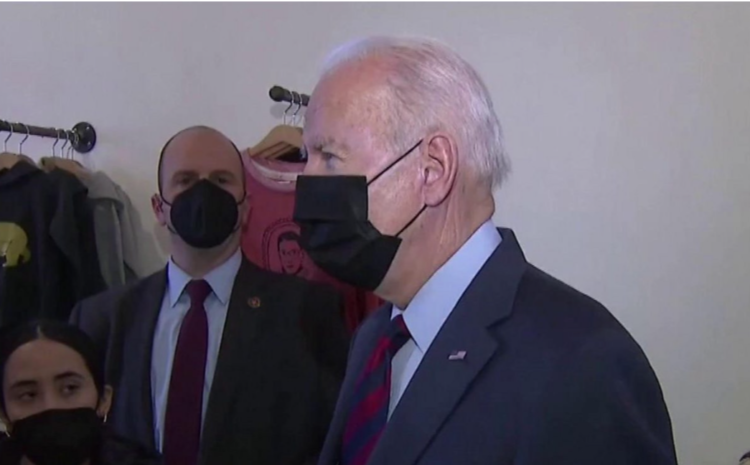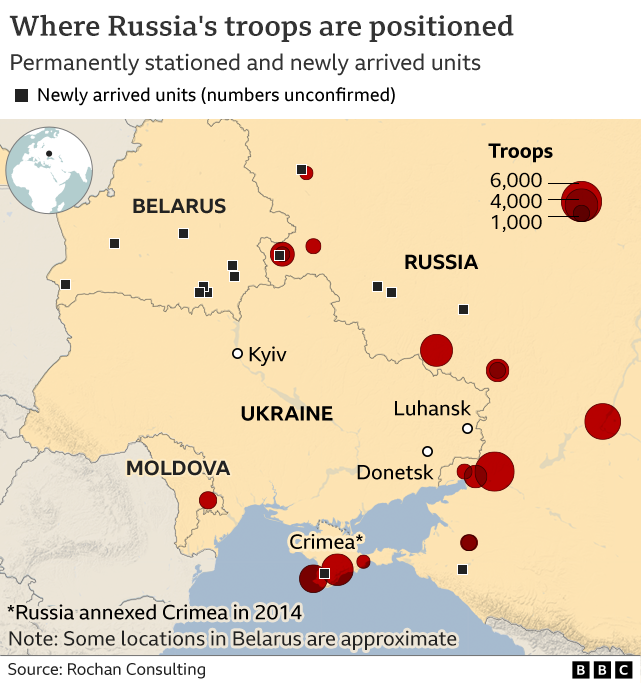
US President Joe Biden says a Russian invasion of Ukraine “would change the world”
US President Joe Biden says he would consider personal sanctions on Vladimir Putin if Russia invades Ukraine.
Mr. Biden said there would be “enormous consequences” for the world if Russia made a move on the nation, which sits on its southwestern border.
His comments came as other Western leaders repeated warnings that Russia would pay a heavy price for invasion.
Russia has accused the US and others of “escalating tensions” over the issue and denies planning to enter Ukraine.
However, Moscow has deployed an estimated 100,000 soldiers near the border.
The Kremlin has said it sees the Western military alliance Nato as a security threat and is demanding legal guarantees that it will not add new members further east, including neighbouring Ukraine. But the US has said the issue at stake is Russian aggression, not Nato expansion.
‘Nothing ruled out’
Taking questions from reporters on Tuesday, Mr. Biden replied “yes” when asked whether he could see himself imposing sanctions on the Russian president personally in the event of an invasion.
Such a move across Ukraine’s border would mean “enormous consequences worldwide” and could amount to “the largest invasion since World War Two”, he said.
On Wednesday UK Foreign Minister Liz Truss echoed Mr. Biden’s words, telling the BBC’s Today program that the government has “ruled nothing out” – including sanctions against the Russian leader – and said the UK is looking to “toughen up” its sanctions on people, banks and businesses.
“What is important is that all of our allies do the same. It is by collective action. By showing Putin we’re united, we will help deter a Russian incursion,” she said.
On Tuesday UK Prime Minister Boris Johnson raised the issue of banning Russia from the Swift international payments system, a move which senior Russian officials said meant Europe would not be able to pay for and receive Russian products.
Russia responded angrily to Mr. Biden’s remarks. Dmitry Peskov, a spokesman for Mr. Putin, said such sanctions would not be “painful” for the president but would be “politically destructive”.
He added that Russia’s top government officials were banned from having any assets or accounts abroad and that Mr. Putin’s salary went to the Rossiya bank.
Separately, Mr. Biden’s administration said it was working with oil and gas suppliers around the world to boost shipments to Europe in the event of Russia cutting off supplies, the New York Times reports.
Russia currently provides about one-third of the crude oil and gas imported by the European Union.
“A threat against Ukraine is a threat against Europe,” he said.

Why has the West not imposed sanctions against President Putin before?

It is not unprecedented for Western powers to impose sanctions on heads of government or heads of state. Past recipients of international punitive action include the likes of Robert Mugabe of Zimbabwe, Bashar al-Assad of Syria, and Muammar Gaddafi of Libya.
But to sanction a despot is one thing, to sanction the leader of a major regional power is another. Targeting the head of a permanent member of the United Nations Security Council is rare, if not unprecedented, and to do so would plunge the UN into chaos.
Sanctioning Putin would make co-operation harder on other issues. The West needs his help to revive the Iran nuclear deal. That support might disappear if Putin were sanctioned.
It might also make it harder for Western leaders to meet Putin personally to discuss international crises. He might not be able to travel to Geneva or it might be illegal for the Western leader to meet him in Moscow.
Sanctioning Putin might also make him more popular at home – Mugabe certainly used his sanctions as an electoral asset. They also might not work in a technical sense. Russia experts say that much of Putin’s personal wealth is hidden away in the hands of third-party proxies.
And then there is politics. Sanctions are often done – and are best done – with allies. It might be hard to get unanimous support say, within the European Union, for personal sanctions against the Russian leader.

Mr. Biden also said on Tuesday that he would feel obliged to beef up Nato’s presence in eastern Europe if Russia invaded, but he repeated that there were no plans to send US troops to Ukraine itself.
The US has already put 8,500 combat-ready troops on alert to deploy at short notice. Russia has accused the US and NATO of “flooding” Ukraine with weapons and Western advisers.
Washington has also warned Russian ally Belarus that it would “face a swift and decisive response” if it assisted in an invasion.
Russia seized Ukrainian territory before it annexed Crimea in 2014. After Russian forces seized control, Crimea voted to join Russia in a referendum the West and Ukraine deemed illegal.
Russian-backed rebels also control areas of eastern Ukraine near Russia’s borders. That conflict has cost an estimated 14,000 lives, with a 2015 peace deal a long way from being fulfilled.

